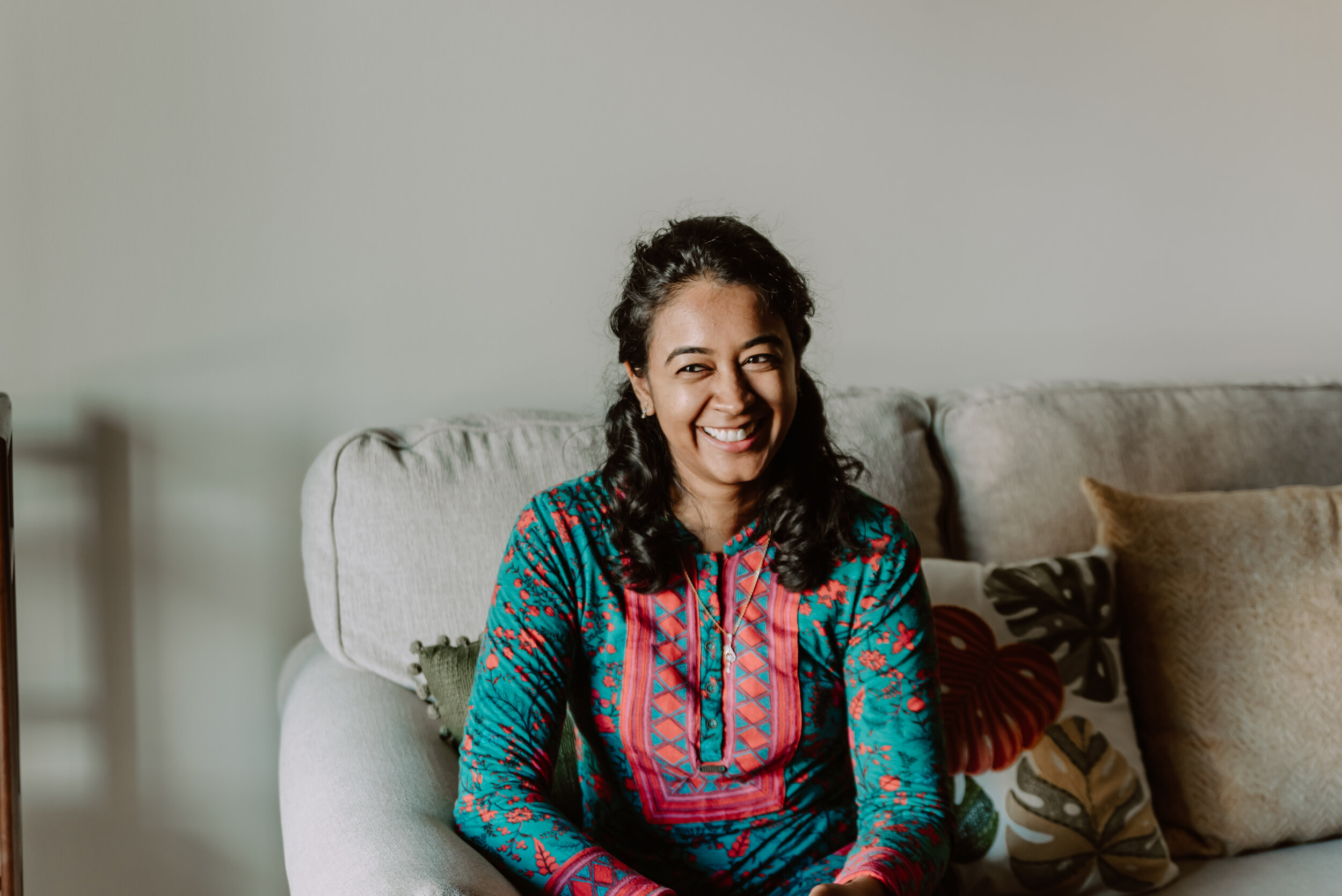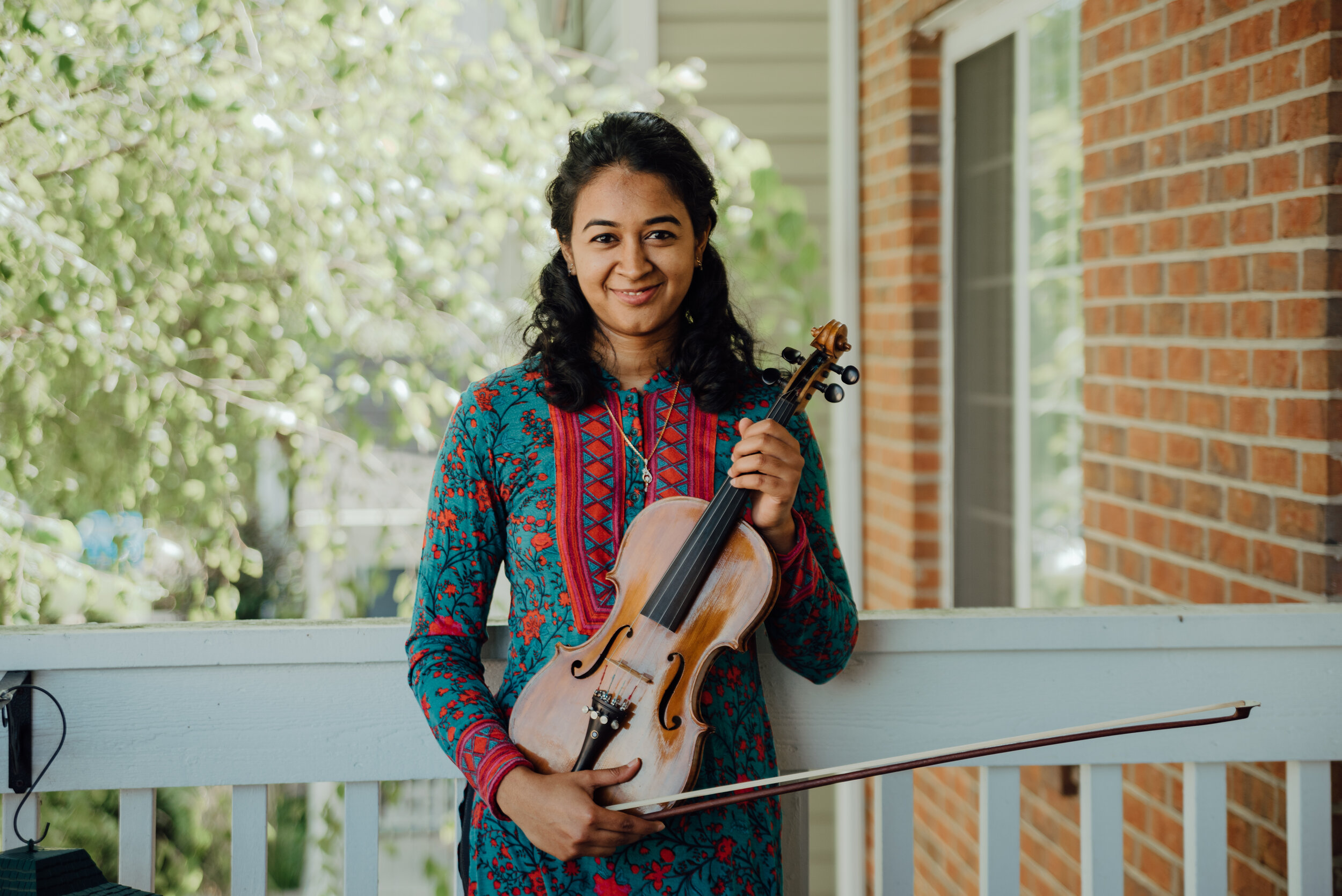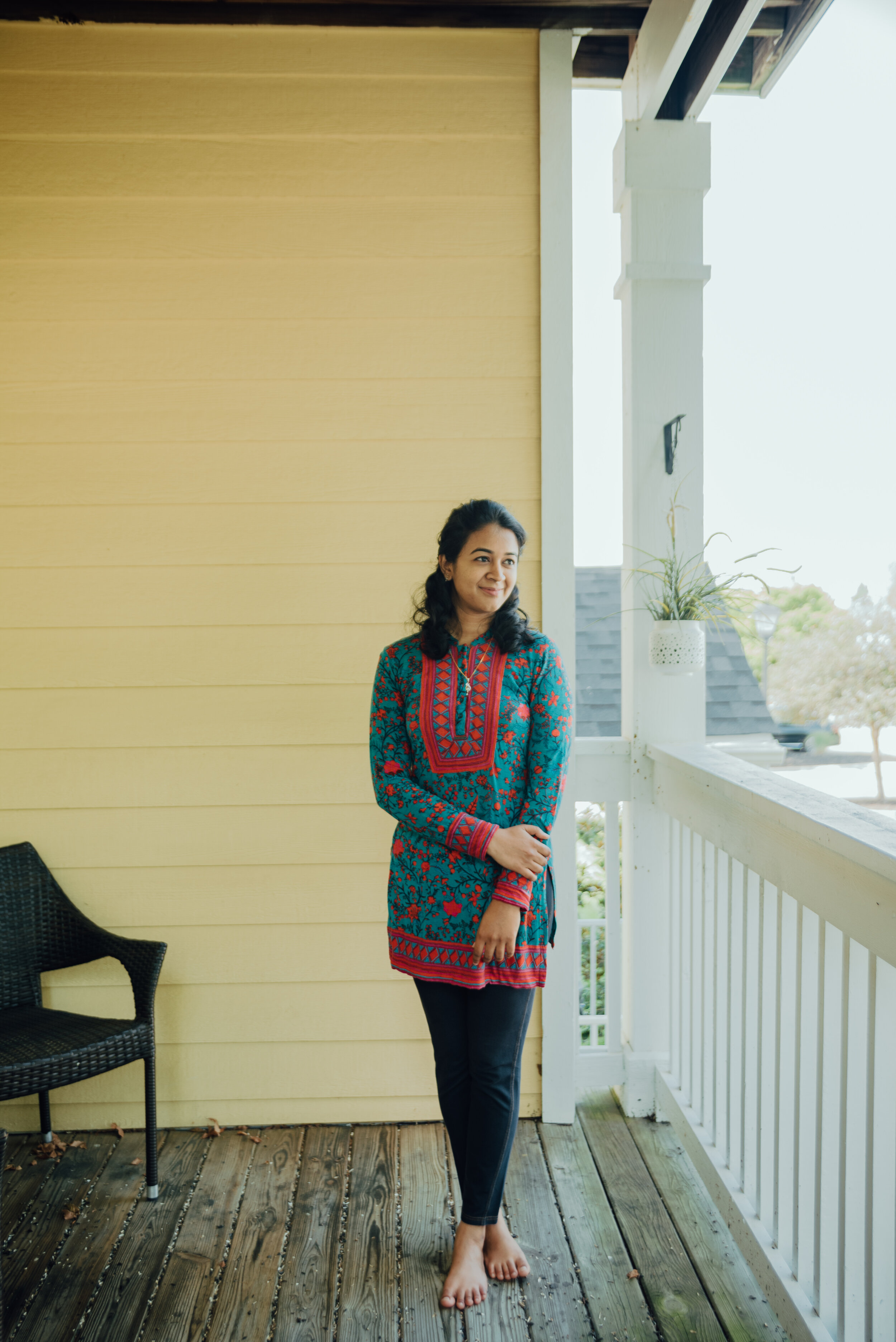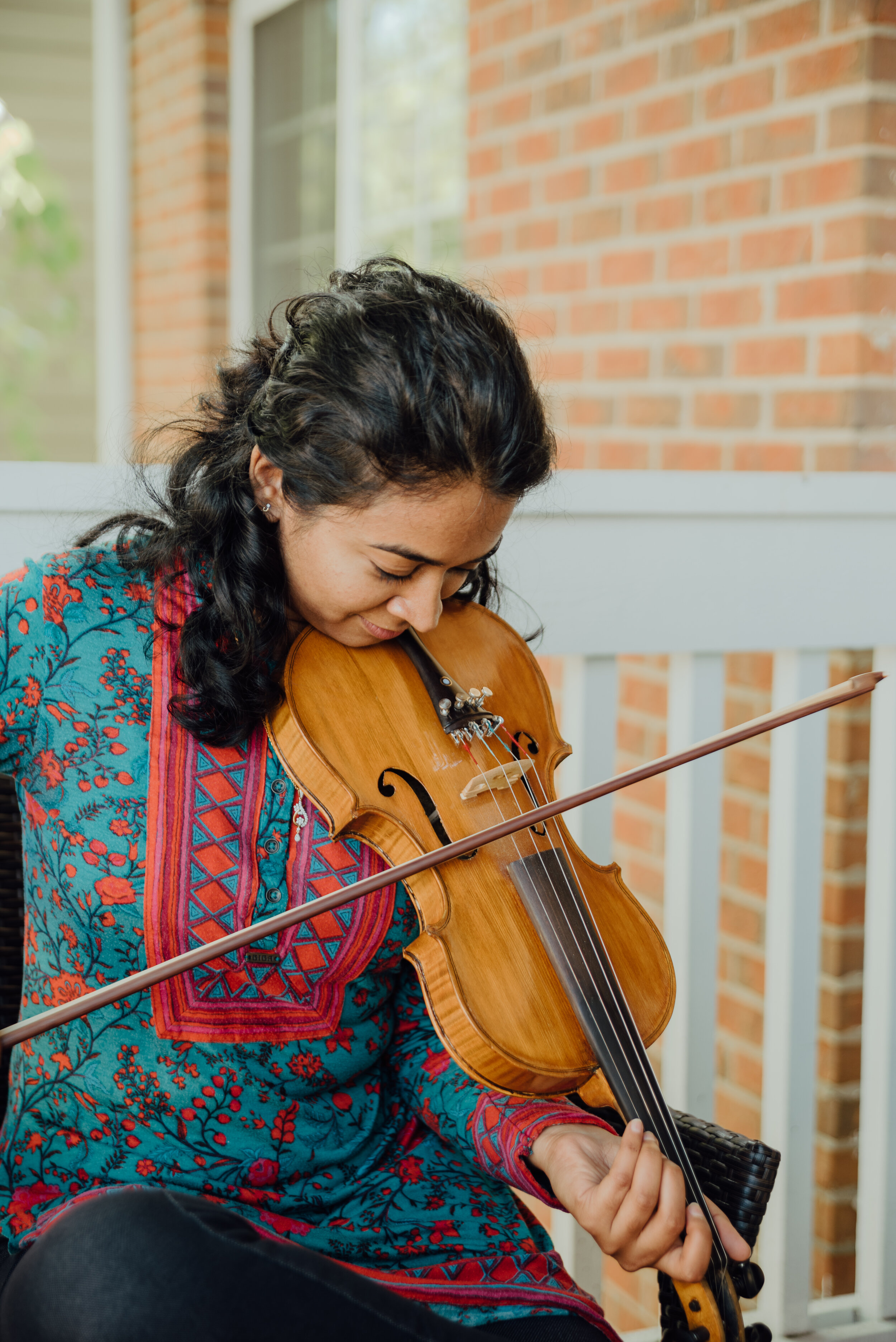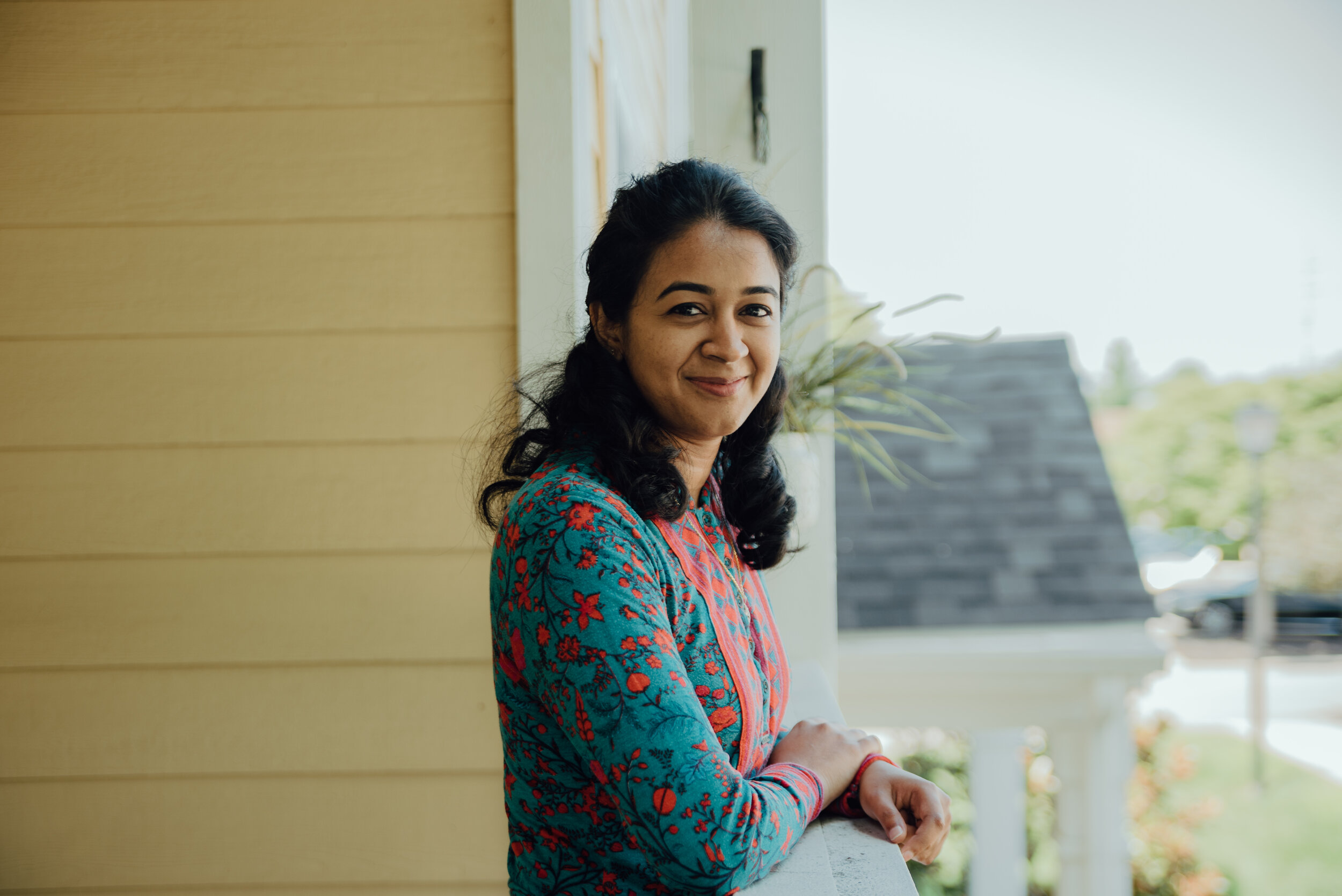Chinmayee Nagaraj: Genetics, Music, and ‘Why Not?’
Chinmayee Nagaraj is learning as she goes. She traveled across India performing as a vocalist, unsure if it would lead anywhere. She studied genetics in college, not knowing if it was a realistic career. But she knows herself.
When she speaks, she is deliberate with her words and distinct in her meaning. And her courage has paid off. She now works as a genetics counselor at Cincinnati Children’s Hospital, testing different medical conditions and interacting with patients. When she’s not in the lab, she still trains as a musician, and she spreads her love for music as a teacher for young pupils. Formed by music, science, and the strength of family, Chinmayee’s perspective is one of radical bravery – to willingly throw yourself into the unknown, because, well, how else will you learn?
Interview by Blaire Bartish. Compiled by Olivia Taylor. Photography by Moriah Kenton.
So what drew you into the field of genetics?
When I was in high school, I was inclined towards biology, but I had an interest in math and psychology, so I wasn't really sure. In India, the career paths are very distinct. You’re either going into science or you're going into math – you can't really merge them – and you definitely can't find jobs that with those studies combined. I was very unsure of how to mix things with the interests I had.
Between high school and college, I read a book – it was "Genome: The Autobiography of a Species in 23 Chapters" by Matt Ridley. He was a medical journalist during the Human Genome Project. He talked about all the different things they’d done as part of the project, and he was someone who knew how to cover all the scientific information in layman's terms. It was just fascinating, and I think I came across the term “genetic counseling” somewhere in that book, and I just hung on to it. That was not a career that you would have heard in India 10 years back. I thought it sounded cool. During my bachelor's, when people asked me what I was going to become, I said, "I'm going to be a genetic counselor." But I didn't know if that was realistic.
I knew that I’d have to travel abroad to study, but I didn't know what the prerequisites were or what I would need to do to get there. I just kept saying it for a few years; I did a three-year bachelor's and a two-year master's before I came to Cincinnati. I looked around, and there are very few countries that have it, but the U.S. has a very extensive and well-developed profession. These programs started in the late ’70s, early ’80s in the U.S. – and it's a women-dominated field.
So this was my first job after I graduated. Children's is a really big institution, very renowned, and there are really good opportunities in this field. It allows me to do different kinds of things. We have a very big genetics department, so we get to teach; we get to see patients; we get to work in a diagnostic lab that does clinical genetic testing. You learn a lot.
It's been six years since I've been working here, and I’ve been able to change my work. It pays to say, "I want to do something different." So I can give what I have on my plate to someone else who's looking for that and then I can take up something else that's more exciting that I haven't done before.
You're strengthened by the thought of, "Yeah, why not?"
What are you primarily working on right now?
My primary focus for a long time was the diagnostic lab. At Children's, we do a lot of genetic testing for patients that have different kinds of genetic conditions, from hearing loss to immunological problems. Sometimes it can be pretty mild: The child just has a developmental delay or hearing loss or eye issues. But sometimes they’re in the I.C.U., and we need a quick answer. There might be transplantation involved, and testing needs to happen quickly, and we don't know if they're going to survive or not. Sometimes, before we have the results, the patient is no more. It's not always like that, but that has happened, and it still gives answers to the families. We get samples from all over the world; the lab is pretty well known for some pretty niche testing that we do. So, making sure the tests are correct, being a resource for physicians and doctors that order it, writing the reports – especially the abnormal ones – as well as developing new tests… That's kind of the range of things we do in the lab.
I decided that I wanted to get into seeing more patients, as well. I did a different clinic last year with international patients – that was just for a year. My time is split between lab and clinic now, and I'm seeing neuromuscular patients. I'm learning a lot of new things, learning about conditions I wasn't as familiar with. I'm also learning about the logistics of insurance and how to get the testing done.
What advice do you have for women who want to go into the science or medical field?
Science is actually not that hard. Some people would say languages are harder – not everyone can understand an English term and give a good translation. Science is simpler to some extent; it's not abstract.
There are a lot of women in science now, and there are a lot of women doing P.h.Ds in biology – it's actually more women-dominant. I think it's because we, as women, have a more holistic approach to living our lives. We want to have that aspect of interpersonal interactions in our jobs and our everyday lives. And that makes something like a field like this very, very good for us to get into.
As for advice, I think that anyone can do it. You just have to think you can, if that's what interests you. When you're young, give everything a try to really know what interests you. Because we think, "Well, this is all I know, so I'm just going to stick with this." Don't limit yourself. Just expose yourself more so you become aware of more things, and you can choose anything.
Why did you stay in Cincinnati?
I don't think I have a clear answer for that. I traveled a lot as a child: I grew up in Mumbai, but my dad was in a government job in India, so there were transfers involved. I lived in three of the four metropolitan cities in India growing up – a few years in Chennai, then in Delhi (the capital), and then Mumbai, which is the commercial capital. But my parents are from a different state in India, so the language we spoke at home was different from all these states. So I was always an outsider to some extent.
I was drawn to [music]. It's a passion; it's me more than anything else. I think if I have to say what I am, it's music. I'm nothing without it.
I changed like six schools in 12 years, and you're always an outsider because you go into a school; you introduce yourself; you make friends and get started getting used to it; and then you're out and you're doing it again. I think that ingrained in me a sense of being able to go to any place and say, "Okay, this is where I'm setting my tent and I'm going to introduce myself to a few people and I'm going to start from there and see how it goes." I've become quite comfortable doing that over time.
When you start earning by yourself, and you're thinking of a lifestyle, and you're looking at the cost of living… Cincinnati is a good mix for all of that. I feel like the Midwestern culture is just very homey, very familiar, very welcoming, very pleasant.
So, music has been a huge part of your life. With such a busy schedule, why is it important that you find time for it?
I was going to be a musician first. My parents are not musicians themselves, but they're music lovers. They gave me and my sister training in music from very early on – I think I started at 3 and formally at 10. I have an uncle who's a professional violinist, very well known. I trained in Indian classical, so I think my family was like, "You need to learn music and do it well." I guess I didn't really question it. It just was very natural for me.
I was drawn to it. It's a passion; it's me more than anything else. I think if I have to say what I am, it's music. I'm nothing without it. I cannot imagine myself without it. So for a long time, I thought it just made sense for me to plan to be a musician. And then I was in college, and at that time, I said, "Oh, I need to have a reality check because the industry is really difficult to get into and to sustain yourself financially." It's one thing to sing and for it to be pleasant or even win a few prizes, but it's very different for it to translate to being one in a million.
So I said, "Let's give it a try." I gave a few years to myself. I did travel a lot. I got some good opportunities, and you grow quite a bit when you perform. When you're doing back-to-back performances, you get a lot more alert in your thinking. As the vocalist, you're the person who's leading the group, so you have to hold it together for everyone. It was really fun.
I teach kids now. Most of them are Indian kids, and they come because their parents recognize this art form. They want their children to have a familiarity with this part of their culture. Music helps us all out; we all listen to music – when you're happy, when you're sad. I try to see how to make it more relevant for these kids, and it's definitely easily translatable to any other form, any other genre. But beyond that, they can come out of it with something new and be proud that it's an Indian element, that it’s part of where they come from.
It’s always great when parents encourage their kids to go into music because you don't always get the support.
Yes, and my parents, they're very accepting, open, and very loving and supportive. No matter what it is. They're always there. They have your back. To be a professional musician means having to travel and having that kind of lifestyle, and you're still expected to do everything. My dad is a very daring, open guy. He had the responsibility of his entire house when he was 18. I think I get a little bit of my courage from him because he's like, "Yeah, why not?" And then you're strengthened by the thought of, "Yeah, why not?"
Sometimes you're heading in a direction because you think that's what you can do. But what else can you do?
I used to travel late at night, and coming back from concerts, I took the train by myself. It's not something that you see in India, because it's not safe, so there's a good reason why it doesn't happen. But some families are over-protective to the point where they’re stopping some of the opportunities. I dated, and I did things that Indian parents would not allow their children to do. They just would not. I think it was their trust in me – their openness and recognizing my personality and accepting it.
It's been very interesting bringing those traditional ways and values and mixing that with a kind of openness to the unconventional. I'm very privileged, but sometimes it's been an uphill walk being a woman. Even coming from such a privileged background with education and supportive parents, there's still a feeling that, being a woman, there are things that I have to do slightly differently, or some things didn't make an impact because I'm a woman. As women, we want to do everything, and that makes it hard for us, too.
Where do you see yourself in 10 years?
I don't know. Until a few years back, I had a very clear idea of everything, and it's also very easy to have that kind of framework when you're in school and college and then just starting to work, and you think you have it all figured out. I thought that I had it all together. It's easy to have a goal until you're 25. After that, life just gives you stuff.
I thought that it was easy to plan – but I had one or two plans stumble. I guess the main one was, I thought, "Okay, college is done; I'm going to find someone, and that's going to be it." I did have a relationship, but it wasn't a very pleasant one. It wasn't a relationship that allows a person who wants to do so much to do it. I decided to get out because it just didn't make sense. I think that process also gave me some time to think, because until then, I thought, "Oh, I'll get a job; teach or perform," and I was doing all of that, but then I was like, "Okay, now what? What am I heading towards, and where is this going to leave me?"
So I was in this state of being unsure and feeling a little lost with where I wanted to head, but I guess with me questioning everything, I knew what I wanted to hold onto. And I knew what gave me energy. I love interacting with students and training them. I love working with patients, publishing something that we worked on, giving a presentation somewhere, being invited to speak on something. Those are things I love to do, and I just stuck to what felt like it needed to be there. And I stopped questioning, "Where am I headed? Why am I doing it?"
The answer became pretty obvious: I want to do it. I cannot not do it. I'm going to continue being a genetic counselor. There are very different kinds of roles you can take, different expertise you can develop over time. Being a musician – performing when I can, teaching the kids around here… Traveling, learning more about people, about me, about things in general… But exactly what will I be doing in 10 years with my life? I don't know. I want to do a lot, but I'm sure I'm going to keep these things up because that's what's me.
Sometimes you're heading in a direction because you think that's what you can do. But what else can you do? I don't have any frameworks anymore. Sometimes, being shaken from structure gives you a chance to go in a different direction. And I found it confusing in the beginning, but through my overall journey over the last few years now, I find it liberating. I don't need to have a certain goal. Goals form as you go.
Who are the influential women in your life?
My grandmother, my music guru – she is just about 75. I was her first grandchild. She had her children very young. She was married when she was 14, and she had her first child at 15. By 25, she had five children. Her dad was a musician, a violinist. She also used to sing; it was actually during one of her performances that my granddad saw her and liked her. He asked his mom to ask for him for her hand in marriage. We're talking about 60 years back, and I think it was just right after India's independence, so we're talking about a very different era. She didn't really have a choice in the marriage because she was the first of nine daughters. They just had to do it. Things are different now for many, many reasons.
She was a crazy, daring lady because she wanted to make sure all her kids got an education. She had four daughters and a son. She didn't get any of her kids married until they were 24 or 25 – that's an incredible achievement for that generation. Living in a village, she let her daughters go out. My mom did her bachelor's and master's with a sports scholarship. One of my other aunts did it on a music scholarship. She wanted to make sure that her kids got an education, and that they also received some training in music. She really, really worked hard; she threw fuss and tantrum to make sure that her kids got an education. She was able to send them out to study, and I don't know how. There wasn't Google; there was no phone. She was very resourceful. She now uses YouTube; she's on WhatsApp; she's very savvy. She's a big inspiration to me and all of my family because to be that resourceful, to be that driven and passionate, and to have such a strong belief in something that you're ready to face some pretty big hurdles to make it work… It has paid off. She's a very strong, positive influence on all of us.
Another one is my music teacher. She is about 85 now, and her husband is about 90. They're like another set of grandparents. I've learned from her for 20 years. I joined her when I was just about to go into high school, so she's seen me throughout my life every week. They've seen me make my choices in life and for someone of their generation – they're pre-independence in India – they are so amazingly in-tune with today's thoughts and perspectives and how to understand us and where we’re headed. It is an effort to understand the next generation, to understand someone who's just 10 years younger than you, and to keep up. But they’ve kept up amazingly well. I cannot imagine the kind of mental maturity and acceptance and adaptability it takes for you to remain that relevant for so long. She's a great musician, and I have learned so much from her, and to be able to grow old with that grace is a dream.
Do you know an awesome woman of Cincy? Nominate her here! New features launch every Monday.



